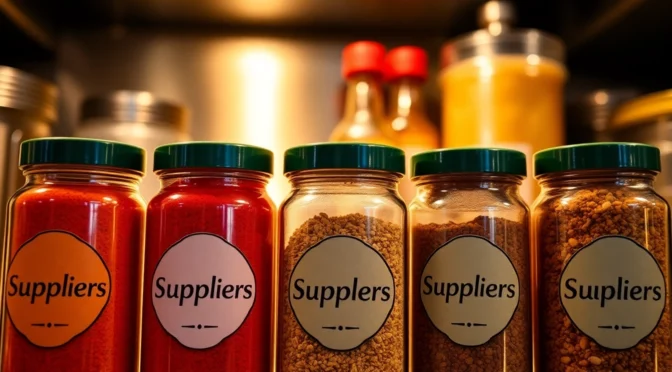Understanding the Critical Role of Food Suppliers in the Global Spices Industry
In today’s dynamic food industry, the importance of reliable and high-quality Suppliers cannot be overstated. As consumers increasingly seek authentic, organic, and ethically sourced products, businesses must align with suppliers that uphold stringent quality standards. The spices and processed food sector, in particular, relies heavily on trusted suppliers to maintain product integrity, ensure safety, and meet global demand. This comprehensive guide explores what makes a dependable food supplier, how to evaluate and choose the best partner for your business, emerging supply chain trends, and the regulatory landscape shaping the industry.
What Defines a Reliable Food Supplier?
Reliability in a food supplier encompasses various attributes that collectively guarantee consistent quality, timely delivery, and compliance with health standards. At its core, a dependable supplier should demonstrate unwavering commitment to product authenticity, adherence to safety protocols, and the capacity to scale operations as per business needs.
For instance, companies like Spice Nest exemplify reliability by maintaining certifications from major food safety authorities, participating robustly in international food exhibitions, and ensuring traceability across their entire supply chain. Such practices not only foster trust but also enable global export capabilities, positioning them as preferred partners in the industry.
Key Qualities to Look for in Spice Suppliers
Choosing the right spice supplier involves thorough assessment of several key qualities:
- Quality Certification: Certifications like ISO, HACCP, FSSAI, Kosher, and Organic signify adherence to safety, quality, and ethical standards.
- Product Authenticity: Authentic sourcing and processing methods preserve the rich flavors and medicinal properties of spices.
- Comprehensive Product Range: A supplier offering a diverse portfolio—spice powders, whole spices, pastes, pickles, and dehydrated foods—provides convenience and consistency.
- Supply Chain Transparency: Clear documentation and traceability in every step, from farm to factory, reduce risks related to adulteration or contamination.
- Capacity and Reliability: The ability to fulfill large orders within stipulated timelines without compromising quality.
- Innovative Packaging: Modern, airtight packaging extends shelf life and preserves aroma and freshness.
Global vs Local Suppliers: Pros and Cons
Both global and local suppliers have their own advantages and challenges, making the choice context-dependent based on business objectives.
Global Suppliers
- Advantages: Access to bulk quantities, diverse product varieties, and advanced manufacturing technologies.
- Challenges: Longer lead times, higher logistics costs, and potential complexities in compliance and customs clearance.
Local Suppliers
- Advantages: Faster delivery, easier communication, and better support for small to medium-sized enterprises.
- Challenges: Limited product range, smaller quantities, or regional sourcing bias.
Smart sourcing strategies often involve a balanced approach—leveraging global suppliers for bulk, consistent requirements while partnering locally for agility and personalized service. Spice Nest exemplifies a robust model by maintaining extensive domestic manufacturing complemented by international export capabilities, ensuring product quality and reliability.
How to Choose the Best Supplier for Your Food Business
Assessing Quality and Certification Standards
Start by verifying certifications that attest to safety and quality standards. Look for ISO 22000, HACCP, Organic certifications, and country-specific approvals. Evaluate supplier audits, third-party inspection reports, and laboratory test results to confirm product authenticity.
Pricing, Supply Chain, and Reliability Factors
Competitive pricing must be balanced with quality. Evaluate the supplier’s production capacity, lead times, and logistical arrangements. Establish clear communication channels and contingency plans to mitigate supply disruptions.
Building Strong Relationships with Suppliers
Long-term partnerships based on transparency, mutual respect, and consistent performance foster better terms and collaboration. Conduct regular evaluations, participate in industry trade shows like Biofach, and maintain open dialogue to stay aligned with evolving requirements.
Top Trends in Food and Spice Supply Chains
Supporting Organic and Organic-Approved Suppliers
The organic food movement is reshaping supply chains, emphasizing sustainable farming, chemical-free cultivation, and certified organic processing. Suppliers that invest in organic certifications and sustainable practices appeal to health-conscious consumers and premium markets.
Incorporating Sustainability and Ethical Sourcing
Consumers increasingly demand ethically sourced ingredients. Suppliers adopting fair trade practices, reducing carbon footprint, and engaging in eco-friendly packaging enhance their market reputation and compliance with global standards.
Leveraging Technology for Efficient Supplier Management
Digital platforms, ERP systems, and blockchain-enabled traceability tools improve transparency, streamline procurement, and facilitate real-time monitoring of supply chain performance. Spice Nest, for example, employs advanced technology to ensure product consistency and efficient logistics management.
Meeting Regulatory and Certification Requirements
Understanding Food Safety Standards and Certifications
Comprehending regulatory frameworks such as FSSAI (India), USDA Organic, EFSA (Europe), and FDA (USA) ensures compliance across markets. Regular audits, staying updated on regulatory changes, and implementing Good Manufacturing Practices (GMP) are vital.
Documentation and Traceability in Supply Chains
Accurate documentation covering origin, processing, testing reports, and certification is critical for quality assurance and smooth customs clearance. Traceability systems help swiftly address contamination issues and support recalls if needed.
Regulatory Updates Impacting Spice Suppliers
Regulations evolve to address concerns about adulteration, pesticide residues, and food fraud. Suppliers must proactively adapt to new standards, participate in industry forums, and invest in laboratory testing and certification renewal to stay compliant.
Future Outlook: Evolving Market Demands for Suppliers
Adapting to Consumer Preferences for Organic and Healthy Foods
The rising preference for organic, gluten-free, and non-GMO products demands suppliers to adopt sustainable practices and obtain related certifications. Investing in organic farming, ethical sourcing, and processing innovations will be imperative.
Impact of Digital Platforms on Supplier Connectivity
Online B2B marketplaces, trade fairs like Biofach, and digital procurement platforms shorten the sourcing cycle, increase competitiveness, and broaden access to international markets. Developing a strong digital presence enhances visibility and trustworthiness.
Strategies for Suppliers to Expand Globally
Global expansion involves complying with diverse regulations, customizing offerings to regional tastes, and establishing local partnerships. Certification adherence, logistics optimization, and active participation in international trade shows are crucial for growth.
